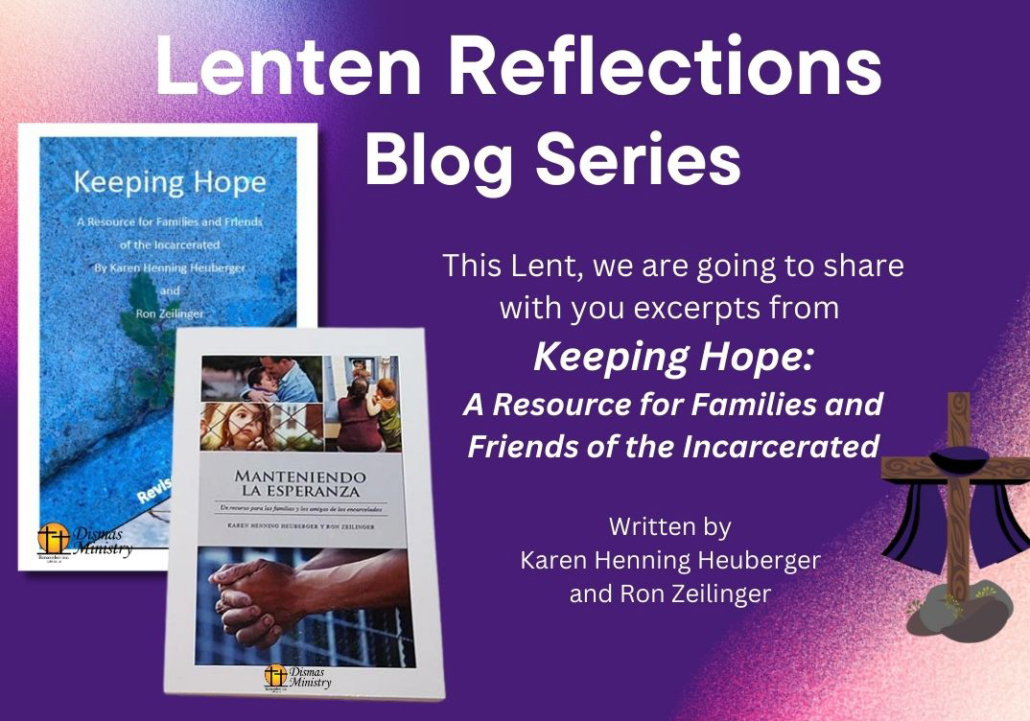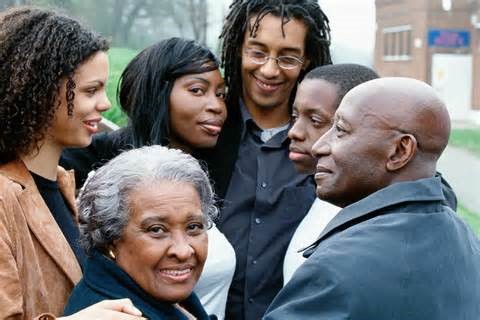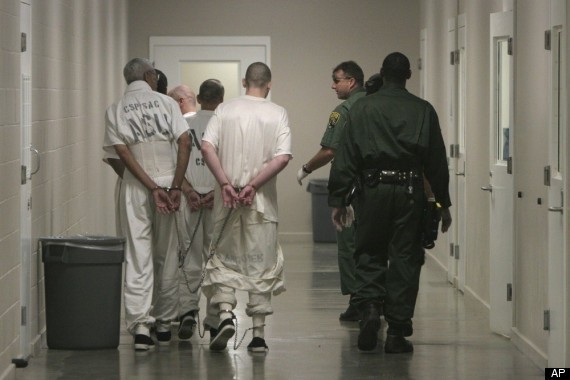This Lent, we are going to share with you excerpts from Keeping Hope: A Resource for Families and Friends of the Incarcerated
Written by Karen Henning Heuberger and Ron Zeilinger
“Being There: Supporting Your Loved One”
Don’t ever give up on them. Hate the sin but not the sinner.
One of the key ingredients in successful rehabilitation for inmates is family involvement. As the California Department of Corrections and Rehabilitation asserts, “Programs already in place in our state…show an enormous rehabilitative benefit from family interaction.” (Reform and Inform Newsletter, 2007) Furthermore, former Wisconsin DOC Secretary Gary Hamblin stated that “helping inmates maintain contact with their families while they are incarcerated also has an impact on recidivism and decreases their chances of re-incarceration.” (walker.wi.gov/press-release/governor-walker-miss-america-2012-announce-read-lead-book-bridge-program).
 When your loved one goes to prison, you must make the decision if you are going to be committed to supporting him or her or not. Once you have decided to support the person, truly commit. Don’t be lukewarm. The more you can show healthy support, the better off he or she will be both during and after incarceration. Do not give up on him or her, especially if this is a first-time offense. Look past what happened and remember the person you love.
When your loved one goes to prison, you must make the decision if you are going to be committed to supporting him or her or not. Once you have decided to support the person, truly commit. Don’t be lukewarm. The more you can show healthy support, the better off he or she will be both during and after incarceration. Do not give up on him or her, especially if this is a first-time offense. Look past what happened and remember the person you love.
For some, the commitment to support your loved one may not happen right away. It may take a sincere letter from him or her as an indication of real change, an effort on the part of the prisoner, or just finding a common ground as you rebuild your relationship. But even if the reconnection comes near the end of the sentence, it is not too late. Doing what you can to support the person at any point of the incarceration can make a difference.
Because your loved one doesn’t truly know what is going on in your life, he or she has to completely trust you and the information you give. Do what you can to build that trust. Be consistent with writing, visiting, talking on the phone. Be encouraging. Make sure the inmate’s name is called often when the mail is handed out in the facility. Send something extra around the holidays. Send pictures, anything with color, things that are allowed but not seen in a prison. Demonstrate your support and that you haven’t forgotten about your relationship. Keep the communication open and flowing.
Helping support your loved one’s faith-life is another important aspect of his or her rehabilitation. Pray together when you can, do bible studies together, and share your faith experiences – all one’s spiritual life. This can help you, too. Both of you growing in faith together not only helps you bond, but helps both of you cope and develop in healthy ways.
Supporting your family member or friend involves both emotional and financial support. People who don’t have anyone to help financially are more isolated. They have no money for personal things that can be purchased in the commissary. So if you can, make sure there is money in the prisoner’s account for the phone and the commissary. Often, there are easy online methods for putting money into your loved one’s account. For example, in Texas there is e-CommDirect (tdcj-ecommdirect.portal.texas.gov/). This service allows you to make online purchases from the commissary which will be delivered to your loved one, or put money directly into your loved one’s account online. Similar to this is JPay (www.jpay.com). Available in more than 30 states, JPay allows you to not only send money to your loved one’s account, but also emails and music. Other services are video visits if the facility participates in this option.
 Educate yourself on any conditions your loved one may have, whether they are mental or physical illness, or an addiction. The more you understand, the more you can support him or her and the more you can advocate if needed. You may also need to educate yourself on legal issues, especially if your loved one plans to make an appeal. While there is some legal help available inside the prisons, you may be the best advocate in your family member or friend’s case.
Educate yourself on any conditions your loved one may have, whether they are mental or physical illness, or an addiction. The more you understand, the more you can support him or her and the more you can advocate if needed. You may also need to educate yourself on legal issues, especially if your loved one plans to make an appeal. While there is some legal help available inside the prisons, you may be the best advocate in your family member or friend’s case.
Advocating for Your Loved One
Advocating for a prisoner can take various approaches. It depends on each person. One way is simply being the person’s advocate within your family. You may need to speak up for him or her with members of the family who are not so supportive. You may not get them to start writing or visiting, but just helping family members understand the situation better can promote an attitude of reconciliation or at least tolerance.
Advocating within the system may present more formal involvement. At the time of sentencing, you may be able to give input as to what you think your loved one needs as part of his or her program (i.e. drug treatment, anger management, etc.) Some states have councils made up of inmate families to help resolve issues during incarceration, such as the Ohio Department of Rehabilitation and Correction (ODRC) Family Council.
Otherwise, you may simply have to be willing to take a stand on your own. For example, your advocacy may revolve around a condition your loved one has. If you are not happy with the medical care the prisoner receives, you may need to speak up on his or her behalf. There is a usually a process set up in the system – either at the correctional facility or at the state Department of Corrections level — to make a complaint, but if you are not getting the response you need, you may need to contact the ombudsman or other appropriate person in the system. If your loved one has mental illness, you may have to advocate for the person just to get needed treatment, whether it is counseling or medication. Keep asking “who else might help with this?” until you reach the right person.
If you need to advocate for your loved one on a legal level, i.e. making an appeal, you may feel out of your league. But there are options for getting legal help. Often the prison has a legal expert who can give advice. You can also do your own research. Some organizations, such as The Innocence Network, will provide free assistance in certain types of cases. More generally, there is some form of a Legal Aid Society ready to provide help.
READ MORE FROM KEEPING HOPE BY PURCHASING YOUR COPY ON OUR STORE PAGE.

This Lent, we are going to share with you excerpts from Keeping Hope: A Resource for Families and Friends of the Incarcerated
Written by Karen Henning Heuberger and Ron Zeilinger
“Coping: Finding Support”
Finding support when you have a loved one who is incarcerated is not always easy. If you are afraid to tell others, you may carry the burden alone. But if you can reach out, you may find there are many sources of support that you didn’t know were there.
Family and Friends
If you have good relationships with those in your family, they can be an immediate source of support. Since your family is likely already aware of your situation, that will save you the process of having to share your story initially. Family members, though they deal with things differently, often have a common history with the offender and you can share on a deeper level more quickly. There will be a better sense of understanding, especially if they have been involved in your life and the life of your loved one.
If your relationship with family is strained, close friends may prove a better option. Friends who have journeyed with you through the trial and sentencing process can be invaluable as you deal with the time of incarceration. Opening up to them, honestly sharing your feelings about the situation and your loved one, positive or negative, can have a great healing effect. As mentioned in Chapter One, you may want to choose carefully whom you tell at first. Choose someone who has proven to be open and supportive and has previously held your deepest feelings as sacred.
Church Community
 If you belong to a church community, talking with your pastor may be a good starting point. Not only should the pastor be able to listen to you, but should also be able to give you some guidance in your situation and help you find the resources you need. Just being involved in a small faith community can be a support to you. It can be a community where you receive prayer and acceptance. But there may also be a specific “families of the incarcerated” program in your parish or diocese. Or your pastor may even be able to put you in contact with another family in your parish who also has a loved one in prison. Starting on common ground can help you form a support network. Hearing about how another family deals with their situation may give you ideas about what might help you.
If you belong to a church community, talking with your pastor may be a good starting point. Not only should the pastor be able to listen to you, but should also be able to give you some guidance in your situation and help you find the resources you need. Just being involved in a small faith community can be a support to you. It can be a community where you receive prayer and acceptance. But there may also be a specific “families of the incarcerated” program in your parish or diocese. Or your pastor may even be able to put you in contact with another family in your parish who also has a loved one in prison. Starting on common ground can help you form a support network. Hearing about how another family deals with their situation may give you ideas about what might help you.
Your pastor should also be able to connect you with resources that meet your physical/financial needs as well. With the financial burdens of having a loved one in prison, you may need to find help with rent or utilities. You may need food, clothing, or even school supplies for your children. Church parishes are great sources of such support.
If you do not already have a church community, you may want to seek one. Finding one where you feel you’ve “come home” is important, especially as you look for support and acceptance during this time in your life.

Prayer
Many family members said that without prayer and faith, they wouldn’t have made it through their experience. Staying positive, holding on to hope, and taking everything to God has made a big difference for them. Don’t hold back on your real feelings when you approach God. Go as you are, being honest with all that is inside of you. Letting it out with God may help relieve you of some of the emotional burden. Using prayer and meditation to find peace and maintain an inner calm can help you tolerate the trials that arise in daily living.
Education
Sometimes just increasing your knowledge can help you cope with the situation in a more productive way. Understanding the correctional system better, or the crime that was committed, can help you deal with what happened. If your loved one has an addiction or any form of mental illness, learning about these issues can help you understand your loved one better and can help you relate to him or her more constructively, especially when visiting. It can also help you more fully support him or her.
It may help you communicate with him or her in more meaningful ways and demonstrates that he or she still matters to you despite what has happened. Education not only helps you understand the situation and your loved one better, it can also help you understand yourself better. Learning about living as a family member of the incarcerated can help “normalize” your feelings. It can help you understand why you are feeling what you feel, and give you alternatives as to how to deal with your situation. Education can empower you as you move forward and face the challenges of having a loved one in prison.
Counseling
Beyond education, therapy can also empower you. Therapy with someone who is knowledgeable of your situation can help you tap your strengths as you deal with your burdens. A therapist can teach you skills that will help you in daily living as well as in your interactions with your loved one. Many therapists work on a sliding-fee-scale, so you can find someone within your financial means.
If your faith-life is important to you, spiritual or religious counseling may give you support as well. Religious counselors through churches may not be certified psychologists, but may help you draw on your faith to deal with hardships. They may help you look at your situation through the lens of faith.
Some programs set up for families of the incarcerated offer counseling as part of their services. The services may be for individuals or the family as a whole. In these programs, because they are geared for families of the incarcerated, counselors are well-versed in the issues facing such families and can often provide practical, proven ideas for dealing with the unique challenges you may face.
Retreats
Retreats, getting away from your daily routine, can provide you with time to reflect, to have some quiet, and to draw a sense of peace and strength to deal with your challenges. They usually involve talks followed by activities to reinforce what you learn. Such retreats can be general, focusing on your own spiritual journey, or you can choose one that is focused on those whose loved ones are in prison. One example is Kairos Outside. While the Kairos program is for inmates, Kairos Outside was developed for women whose loved ones are incarcerated. One healing activity at this retreat is celebrating birthdays for the celebrations you so often miss with your loved one gone. Regardless of the specific activities though, retreats can help you realize life goes on. They can help you work through your feelings and connect with others. They can provide support in a safe atmosphere.
READ MORE FROM KEEPING HOPE BY PURCHASING YOUR COPY ON OUR STORE PAGE.

This Lent, we are going to share with you excerpts from Keeping Hope: A Resource for Families and Friends of the Incarcerated
Written by Karen Henning Heuberger and Ron Zeilinger
“Special Circumstances”
Mental Illness – If your loved one has a mental illness, you may face the challenge of trying to make sure he or she is getting needed treatment. Unfortunately, other than changing laws at the national level, you cannot force your loved one to take any necessary medications. And if you are not the inmate’s legal guardian or hold power of attorney, the correctional system does not inform you of your loved one’s medical status unless the appropriate forms have been signed beforehand. Often this can take weeks.

This means that if your loved one doesn’t want you to know whether he or she is taking medication or not, you will not be informed. (If you do become your loved one’s legal guardian, you will be responsible for any issues that arise after release.) Also, oftentimes the prisoner will be given enough medication to make the person cooperative in prison, but not necessarily enough to make him or her function at a “normal” level. This can be very frustrating for you. If your loved one is not on the correct medication, or at the appropriate dosage, it may make it even harder to connect with him or her.
When visiting or talking on the phone, you may not know what to say that won’t agitate him or her. For example, conversations may trigger your loved one’s delusions. Or the inmate may cancel visits or not respond to contacts. The inmate may want to put everything behind them including you.
Juvenile Offenders – If your incarcerated loved one is a juvenile, you may feel even more of an emotional strain. If you are the parent of the offender, you may feel responsible your child’s actions. Parents usually worry about their children going down the wrong path. Juvenile offenders may have come from foster homes, abusive situations, or other institutions, so their connection with people who care about them may be more strained. They may feel more connected to their peers or a gang, who may be part of the reason for the incarceration. This may make it difficult to maintain a close relationship for you and others who want to stay connected and support them.
Immigrant Detainees – If your loved one is detained because of an immigration status only, there are often the challenges of an indeterminate length of incarceration and the threat of deportation. Immigrant detainees are not legally entitled to counsel and may have to prepare their cases for themselves while incarcerated. They are often moved around to facilities hundreds of miles away and transfers may occur often without notice.
According to Human Rights Watch (hrw.org), “52 percent of detainees experienced at least one such transfer in 2009” and “over 46 percent of transferred detainees were moved at least two times, with 3,400 people transferred 10 times or more.” This situation may make it especially difficult for you to visit or even to stay in touch.
If you are able to visit the detention facility, remember that you need a current, valid ID to get in. If you are undocumented as well, it may not be safe for you to stay in contact. You may then not know where your loved one is or how the case is proceeding. You may not know how to help your loved one’s case. This can be heartbreaking. Even when legal counsel is not available, in most communities there are agencies and churches that may be able to assist you in at least locating your loved one without placing yourself in danger.
If the immigrant detainee has children, a custody case may also be in play and preparation for that is done while incarcerated as well. If you can, alert the person to find the law library, and enlist the help of a librarian, a chaplain, or even other prisoners. It is important that your loved one has a plan in place for the care of his or her children, especially with the threat of deportation. Otherwise the children will likely enter the foster care system and may be separated from the family indefinitely – if not permanently.
Parole – If the prisoner has been released on parole, you may find as many or more challenges in your life. You may worry about your loved one violating parole, whether intentionally or not. You may see the parolee struggling to stay out of trouble, get a job or keep a job. Employers often simply don’t want to take the risk of hiring your loved one who has a record. Or you may see your spouse or friend going back to the same group of friends and the same habits that got him or her into trouble originally. You may not be able to do anything about this and just have to watch it happen. If the parolee doesn’t live with you, you may be able to do nothing but hope that the conditions of parole are being kept and the loved one is working to stay straight. Try to avoid gossip, rumors and false accusations from others. There may be many sides to every story.
You may see your paroled spouse or friend taking advantage of family or friends. In some areas of the country, there are “Re-entry” programs designed to support ex-offenders, such as The Fortune Society and Exodus Transitional Community in New York City. If you have access to the Internet, you can do a Google search for “Re-entry programs” in your city, to find what you need nearby. In addition, there are support programs for the families of ex-offenders.
Even if an ex-offender is trying to make changes, “being on the outside” after incarceration can be such a challenge, your loved one may not make it and may return to prison. This may be devastating for you, your family and friends.
No matter what your loved one’s situation is, adjusting to these new challenges in your life will take time, and finding the support you need is absolutely essential. There are many methods and ways to help you cope. You must resolve to find them if you seek reconciliation with your loved one.

READ MORE FROM KEEPING HOPE BY PURCHASING YOUR COPY ON OUR STORE PAGE.
This Lent, we are going to share with you excerpts from Keeping Hope: A Resource for Families and Friends of the Incarcerated
Written by Karen Henning Heuberger and Ron Zeilinger
“Children and Visiting”
If your loved one is allowed to have visitors who are minors, there are things you can do to prepare the children for the visit. If possible, make a visit yourself without the children first, so – according to their ages – you can tell them what to expect, explaining what it is like inside, and explain the basic rules. Answer any questions they may have. You may want to coach them on what to say to your loved one if there are sensitive topics that need to be avoided. Make sure they meet all the requirements to enter (appropriate clothing, etc.) so there is no added stress when it comes to seeing their loved one. Department of Corrections websites can give you further information on children and visiting. Some institutions require specific forms for minors that are available online.

Some correctional facilities are more family-friendly than others. Many of them have rooms where there are games, puzzles, and toys that can be checked out and used. Families can sit in chairs to visit, so it isn’t so scary for the children. Playing games with their loved ones can make the visit seem more normal. Some facilities even have a courtyard with tables and a playground.
In some facilities the correctional officers go out of their way to talk, and even joke, with the children so they feel more comfortable. At Christmas time, Santa may visit the children at some facilities. Many facilities have a restaurant where families can eat together. All of these facets can help make the children more at ease when they visit their loved one.
 Other facilities do not provide these features. Depending on the security level or other factors, children may not be able to touch their loved one. The visit may be through glass or over a video screen. However the children connect with their loved one in a visit, prepare them ahead of time so they know what to expect.
Other facilities do not provide these features. Depending on the security level or other factors, children may not be able to touch their loved one. The visit may be through glass or over a video screen. However the children connect with their loved one in a visit, prepare them ahead of time so they know what to expect.
After you leave the facility, talk with the children and reassure them their loved one is safe. Help them remember the best parts of the visit. In between visits, help the children write letters to their loved one, or have them draw pictures if they are too young to write letters. If it is allowed, let them talk with their loved one on the phone as well.

READ MORE FROM KEEPING HOPE BY PURCHASING YOUR COPY ON OUR STORE PAGE.


